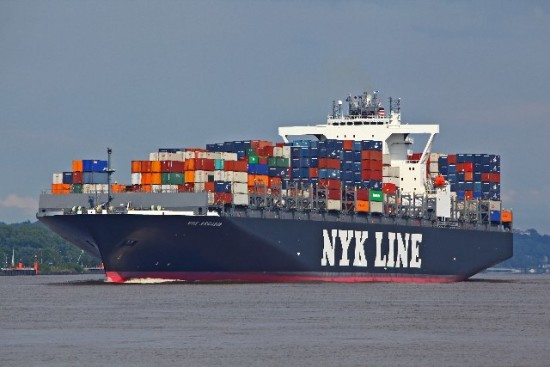Due to crashing freight rates, it is no longer profitable for shipping lines to operate along the Asia-West Africa routes, SHIPS & PORTS DAILY can authoritatively reveal.
As a result of the unprofitability of the route, which includes Nigeria as its major destination, no fewer than three major shipping lines have withdrawn their vessels and diverted same to other routes in the past four months.
SHIPS & PORTS DAILY had reported exclusively on December 14, 2015 that the crashing freight rates had forced a major shipping line, Nippon Yusen Kaisha popularly known as NYK Lines to withdraw from the West Africa route due to growing losses as a result of the twin jeopardy of low freight rates and declining volumes.
The top Japanese shipping line had operated the Asia-West Africa service, which it dubbed WAX, together with Hapag-Lloyd and Gold Star Line (GSL). The service featured two calls in Nigeria, Lagos-Apapa and Lagos-Tincan.
Another major shipping line, Taiwan’s Evergreen Line has also announced the withdrawal of its vessels from the Asia-West Africa route, which had regular calls at the Lagos Port Complex Apapa.
Hull Blyth Nigeria Limited, which acts as shipping agent to Evergreen Line confirmed the withdrawal of the service to SHIPS & PORTS DAILY.
“After three years of serving the market, Evergreen decided to discontinue their service (WA1) due to losses sustained from widening disparity between rate levels and costs. Rate levels especially from Asia have fallen over 50% in the period with the cost levels remaining disproportionate,” Managing Director of Hull Blyth, Christian Holm confirmed to SHIPS & PORTS DAILY.
Messina Line has also reportedly withdrawn from the Nigeria route for the same reasons of widening operating losses.
UK-based Independent maritime analyst, Drewry Shipping Consultants Limited believes more lines will quit the Asia-West Africa route as container volumes continue to fall, resulting in reduced vessel load factors and declining freight rates.
Data from Container Trades Statistics shows that southbound volumes from Asia to West Africa decreased in nine of the first ten months of 2015; compared with the previous year, with the most recent year-on-year declines reaching 10%.
“The lacklustre demand in the trade has forced carriers to curb any growth to capacity with the monthly count of available southbound slots generally static in the last few months,” Drewry said.
It noted that southbound utilisation levels on vessels fell to 64% in October, versus the low-70% range of a year ago.
Spot freight rates have subsequently plunged to around half of their average value of last year, and stood at around $1,800 per 40ft towards the end of 2015.
Drewry said the situation on the trade had gone from “bad to worse”, “showing no signs of recovery”.
Cargo volumes, which have dropped by more than 30% in a year and together with the fast-depreciating naira, which has lost more than 100% of its value in less than two years, has exacerbated pressures on shipping lines and terminal operators some of whom were forced to cut their workforce in 2015.
“The West Africa route is no longer profitable for any line today because of the poor condition of trade. It has been so for more than two years. Only the big lines are able to absorb the losses for now but I really don’t know for how long they will be able to do so,” Mike Stevens, a shipping analyst told SHIPS & PORTS DAILY.
Copyright Ships & Ports Ltd. Permission to use quotations from this article is granted subject to appropriate credit given to www.shipsandports.com.ng as the source.

